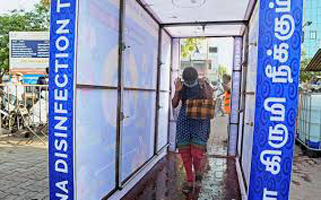NE LEGAL BUREAU
NEW DELHI, SEPT 7
The Supreme Court asked the Centre on Monday as to why it has not banned the use of tunnels for disinfecting people for COVID-19 despite taking the stand that spraying of chemical disinfectants is physically and psychologically harmful.
A bench headed by Justices Ashok Bhushan, R Subhash Reddy and M R Shah was informed by Solicitor General Tushar Mehta that the Health Ministry has not issued any advisory or guideline on the use of ultraviolet lights for disinfection of humans for COVID-19 management.
He said that spraying of any chemical disinfectant is also physically and psychologically harmful for humans.
The bench then asked the SG that when the use of disinfectant tunnels is bad then why the Centre was not banning it.
Mehta said that appropriate directions will be issued in this regard.
The bench was hearing a PIL filed by one Gursimran Singh Narula, who has sought directions to the Centre to forthwith ban the installation, production and advertisement of disinfection tunnels involving spraying or fumigation of chemical disinfectants on humans.
The plea has also sought forthwith ban on spraying or fumigation of organic disinfectants and exposing human to ultraviolet rays for the purposes of disinfecting them.
The Centre in its affidavit submitted that as public health and hospitals are state subject, it is for the States/ Union Territories to implement the guidelines issued by the Health Ministry and the role of the government of India is limited to providing necessary guidance and financial support.
It said that on June 9, an expert committee meeting was held under the chairmanship of Director-General of Health Service to review the use of disinfectant tunnels, various chemicals and spraying of disinfectant along with the efficacy of such use of spraying/fogging.
The Centre said that the committee has reiterated that spraying of individuals with the disinfectants (such as tunnels, cabinets, cambers) is not recommended as it would not diminish the infected person’s ability to spread the virus through droplets or contact.
The affidavit, filed by undersecretary in the Ministry of Health and Family Welfare (MoHFW), said the committee further observed that spraying disinfectants is not recommended in both health-care and non-healthcare settings.
“It was also observed that in indoor spaces, routine application of disinfectants to environmental surfaces by spraying or fogging (also known as fumigation or misting) is not recommended for COVID-19 as the disinfectants may not be effective in removing organic material and may miss surface shielded by objects, folded fabrics or surface with intricate designs,” it said.
The committee has stated that spraying or fumigation of outdoor spaces, such as streets or marketplaces, is also not recommended to kill the COVID-19 virus or other pathogens because disinfectant is inactivated by dirt and debris and it is not feasible to manually clean and remove all organic matter from such spaces, the affidavit said.
“Even in the absence of organic matter, chemical spraying is unlikely to adequately cover all surfaces for the duration of the required contact time needed to inactivate pathogens. Furthermore, streets and sidewalks are not considered to be reservoirs of infection for COVID-19. In addition, spraying disinfectants, even outdoors, can be harmful to human health,” it said.
The Centre said it had taken cognizance of media reports where it was reported that persons were being sprayed/ fogged with chemicals and/or exposed to such chemicals through walk-in tunnels and after that, a meeting of Joint Monitoring Group (experts body) was called on April 8.
In the meeting, it was recommended, “spraying of disinfectants on humans is not recommended under any circumstances. Spraying any chemical disinfectant is physically and psychologically harmful. Further, chemicals are harmful to human skin and the mucous membrane of the respiratory tract, if needed”, it said.
External spraying of any chemical disinfectant does not kill a virus that has already entered the body of a person, who has earlier been exposed to the virus, the Centre said.
“It is evident that the answering respondent nowhere issued any advisory/guidelines/ SOPs for usage, installation, production, advertisement of disinfection tunnels involving spraying or fumigation of chemical/ organic disinfectants for the purposes disinfecting human beings in the workplace/office/public places/external environments,” it said.
The Centre said that even ‘National Guidelines for infection Prevention and Control in Healthcare Facilities’ enumerated that disinfectant fogging is not recommended for routine patient care areas.
“It was also prescribed that fumigation and fogging have no role in the operation theatre because fumigation with formalin is hazardous to persons and can also harm sensitive equipment,” it said.












